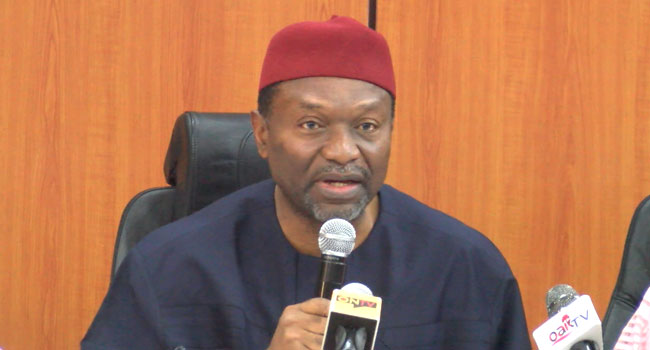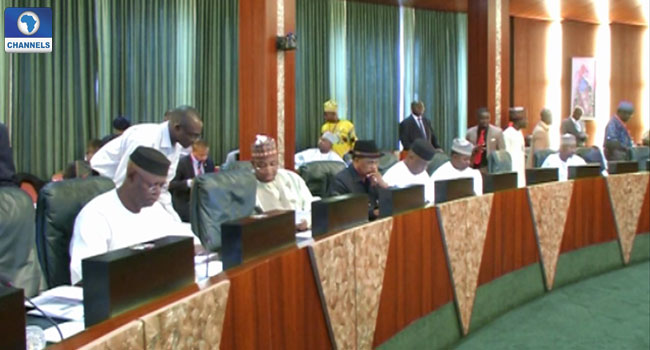CHANNELS TV
Federal lawmakers in the Nigerian Senate at the beginning of legislative proceedings for the week passed a recommendation opposing the sale of government’s assets.
The Senate President, Dr. Bukola Saraki, had last week in his address to lawmakers recommended that the executive should raise capital from the sale of the nation’s assets and other sources to shore up reserves.
He said the sale of assets would calm investors, discourage currency speculation and stabilise the economy that is in recession.
However, lawmakers are strongly opposed to this recommendation.
The lawmakers also approved a recommendation that the National Assembly should amend Section 162 of the Constitution to give legal backing to the executive to save money for times of economic slump?
It is a necessary law, some lawmakers believe, as previous administrations end up sharing excess crude oil sales money between states since there was no law to back its retention.
The proposed assets sale has drawn diverse reactions, with some against the decision saying revenue generated through the sales could be frittered away.
Nigeria has lost huge revenue to corruption and many fear corrupt officials could embezzle the funds. They are suggesting that the government should look at other means of generating funds or explore the right channel in the privatisation of assets.
Fiscal Stimulus Plan
Explaining the government’s fiscal stimulus plan earlier on Saturday, the Minister of Budget and National Planning, Senator Udo Udoma, said that the primary objective of the plan was not to sell off all major critical national assets but to source immediate funds to reflate the economy and implement capital projects in the 2016 budget.

Senator Udoma gave the explanation in Lagos at the weekend while briefing reporters on the forthcoming Nigerian Economic Summit.
He said the intention of the government was just to get enough money to fund the 2016 budget and get the economy back on the path of recovery.
The government, he stated, needed to inject a large dose of funds into the system to get the economy back on track and to faithfully implement the provisions in the capital budget tailored at reflating the economy and aiding the diversification process.
Senator Udoma further explained that the country had lost almost half its expected revenue and would need to urgently source for the shortfall to enable the government faithfully implement the budget.
“This unfortunate scenario prompted the Economic Management Team to urgently work out a fiscal stimulus plan to generate immediate large injection of funds into the economy through asset sales, advance payment for license rounds, infrastructure concessioning, use of recovered funds, among others, to reduce the funding gap.
“The other option would have been to source for additional loans, beyond the level of borrowing already projected for in the 2016 Budget.
“This would not be a wise option as it would raise the level of debt service to an unsustainable level.” a statement by the Minister’s spokesman, Akpandem James, read.
On September 22, the National Economic Council approved President Muhammadu Buhari’s strategies to pull the economy out of recession.
This was done during its meeting in Abuja, chaired by the Vice President, Professor Yemi Osinbajo.

The council of ministers and governors debriefed the Finance Minister, Mrs Kemi Adeosun and the Minister of Budget and National Planning, Mr Udoma Udo Udoma as well as the CBN Governor, Godwin Emefiele on the strategies to take the country out of the woods.
Briefing State House correspondents after the closed-door meeting, the Deputy Governor of Ogun State, Yetunde Onanuga, said that the Central Bank would henceforth adopt best options to manage the situation.
Other areas of urgent intervention were also agreed upon by the council to immediately inject larger funds into the economy, including meaningful diversification and more stringent importation cuts.
Nigeria’s economy has slipped into recession with a 2.06% contract in Gross Domestic Product in the second quarter of 2016.
According to a report of the National Bureau of Statistics the decline has caused the Naira to get weaker while lower oil prices dragged the oil sector down.
The output shrunk by 0.36 in the first quarter.
During the quarter, nominal GDP was 2.73% higher at 23.48 million Naira at basic prices.
This growth was lower than the rate recorded in the second quarter of 2015 by 2.44% points.
No comments:
Post a Comment